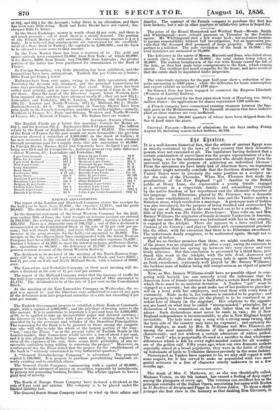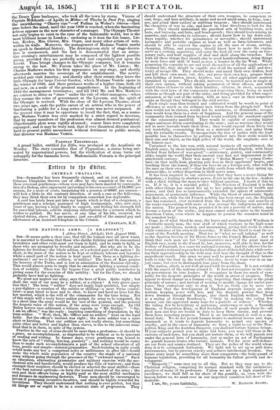The death of Mrs. C. Mathews, or, as she was
theatrically called, Madame Vestris, on the 8th instant, hits, caused a feeling of deep regret among the playgoers of every age. The veterans can recollect her as the principal contralto of the Italian Opera, associating her name with Rosins in Il Barbiere di 4ivigka and Fippo in La Gana Lathe. To those a shade younger she first rises in the memory as that dashing Don Giovanni, in the Drury I e burlesque, who took all the town by storm. Visions of Captain Mheath—of Apollo in Midas—of Phoebe an Paul Pry, singing the un ering " Cherry ripe"—of Fatima in Weber's Oberms—then pass before the mind, until the year 1829 is reached, when the fascinating actress appears in the new character of a manager. The Olympic Theatre not only begins to exist in the eyes of the fashionable world, but is the most brilliant house in London ; enclosing as it does the fair lessee, Lis- ton, Seeley, Mrs. Glover, Mrs. Orger, and many other artists of note, within its walls. Moreover, the management of Madame Vestals marks an epoch in theatrical history. The drawingroom style of stage-decora- tion is commenced, and the fact is demonstrated that an attrac- tive evening's entertainment may be composed of the lightest possible pieces, provided they are perfectly acted and exquisitely, put upon the boards. Time brings changes to the Olympic company, but it remains strong to the last. Mr. Parren takes the place of Mr. Liston ; Mr. Charles Mathews makes his 'first appearance on any stage, and shortly afterwards marries the sovereign of the establishment. The newly- wedded pair visit America ; and shortly after their return they leave the little Olympic for large Covent Garden, which Madame Vestals opens in the winter of 1839, and there produces works of a higher class, both old and new, on a scale of the greatest magnificence. In the beginning of 1842 the management terminates; and till 1847 Mr. and Mrs. Mathews are content to shine as "stars" under the rule of other managers,—when they resume the reins of government at the Lyceum, and the spirit of the Olympic is revived. With the close of the Lyceum Theatre, about two years ago, ends the public career of an actress who in the power of fascinating a public for a long series of years was never surpassed. At the present time it may be opportune to recall the fact, that, as a mana- ger, Madame Vest:xis was ever marked by a strict regard to decorum, that by many members of the profession was almost deemed puritanical. Objectionable plots were rigidly shunned ; coarse lines were completely expunged; and it may be truly said, that if ever theatrical director strove hard to present public amusement without detriment to public morals, that.director was MadaniP Veatris.



























 Previous page
Previous page